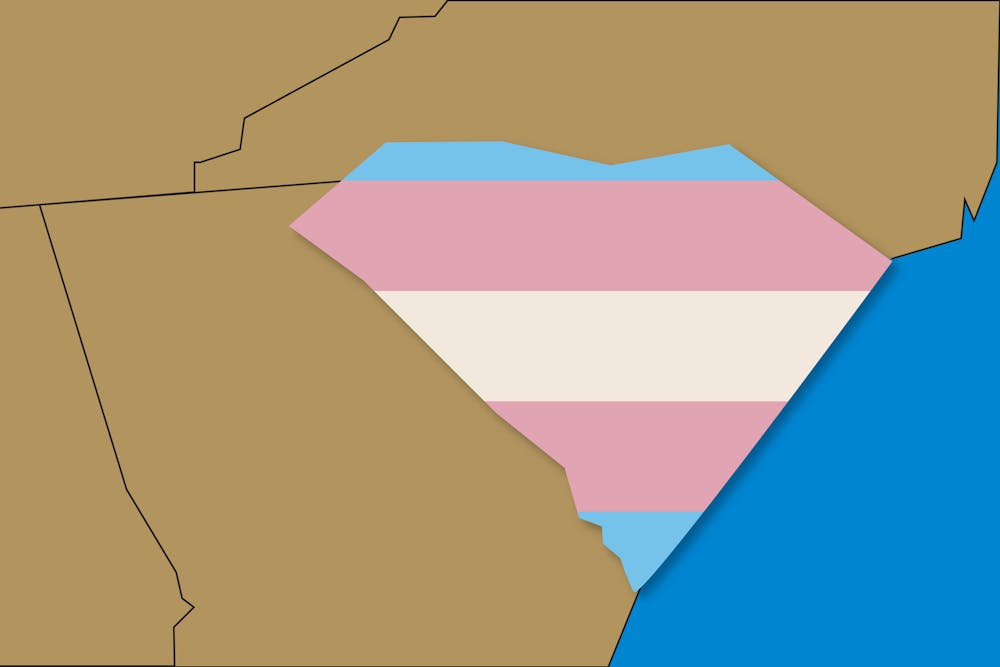When Josie Saint thinks she sees another transgender person in public, she doesn’t say anything. She feels the risk of outing someone and putting them in danger or of misinterpreting someone's gender identity. Concerns like that can make it hard to meet other transgender people.
For transgender people, including those in South Carolina, it can be difficult to safely build community. Legislative and social attacks and personal prejudice can make living in a red state particularly daunting.
"If you are born and raised in a conservative state, there's a much higher likelihood of your immediate family being religious or conservative, therefore leading to tension when you choose to transition," Saint said. "The support structures aren't necessarily there to support trans people in terms of immediate family."
Saint, a musician, moved to South Carolina a year and a half ago to be with her girlfriend, who is also transgender. After starting to transition in May of 2020 as the COVID-19 pandemic was ramping up , she was looking to know more transgender people who shared her experiences, but found them hard to find.
Recently, she began a private Discord group for transgender adults living in South Carolina, which quickly gained members. Discord is a video, audio and text messaging app often used by people playing video games.
The idea for the group began when Saint and her girlfriend went out to brunch with some new friends on March 31, the International Transgender Day of Visibility.
"Being here in public and being visible with a handful of trans friends was something that I didn't realize that I've been searching for and didn't know how badly I needed," Saint said. "We kind of found each other by chance. But it would be wonderful if we could help other trans people who are looking for ways to get connected and don't really know how."
Saint said a significant barrier to building transgender community is threats, both in person and online. Her Discord server is invite only because the internet can also be fraught with anti-transgender harassment. Saint has a couple hundred thousand TikTok followers and around 100,000 on Instagram, where she has received hateful comments.
"Let's say that I posted a QR code with a Discord link in a cafe, right? What's going to stop somebody who wants to commit, or a transphobic person who wants to commit violence against trans people, to see where they are all organized and gathered and be like, 'Oh, look, I can join, say that I'm trans and collect a lot of personal information and then do a lot of harm?'" Saint said.
Saint said that she wants to create as inclusive a space as possible but acknowledges Discord may be harder for some people to use without experience, which is part of why eventually meeting in person is so important.
Evelyn Berry, a Columbia-based poet and transgender woman, said that coming out as transgender can be an isolating experience at first. She helps organize writing and poetry events for LGBTQIA+ people.
"The unique thing about being trans is that you don't necessarily have a built-in community when you come out," Berry said. "A lot of people come to the realization that they are trans in isolation from one another, and generally, for a lot of people, myself included, there is a massive shift not just in how you live your life, but also in your social circles."

The Harriet Hancock Center, a nonprofit based in Columbia and serving the Midlands, also offers support groups and events for transgender and gender-nonconforming adults and children living in South Carolina. Cristina Picozzi, the executive director of the center, said it recently put on a pop-up closet event for people to come and find clothes that reflected themselves.
"I think that that was a really amazing experience not only to be a part of building that event but also just watching people come through," Picozzi said. "We saw somebody get their first dress. We had kids that came to the center with their parents, and their parents are helping them find clothes that help them be authentically themselves."
Picozzi said 49.8% of the people the center serves are transgender or gender nonconforming. The center offers a support group for transgender and nonbinary people called TRANS-FUSION, as well as a Youth OUTLOUD group for all LGBTQIA+ children.
Outside of the groups, the center also keeps a list of healthcare providers who are transgender affirming, so that transgender people can find doctors, therapists, lawyers and hair stylists who accept them and will help them.
"It's super helpful to be able to connect with other trans people in their community to say, 'Hey, this is a safe doctor to go to, this restaurant supports trans people, this is the bar that you know won't freak out about having the wrong sex on your ID,'" Berry said. "Or just working through some of the bureaucratic labyrinth that trans people have to go through when they change their name and gender."
Picozzi said all local organizers for events and spaces feel the weight of recent legislation passed in South Carolina that prohibits minors from seeking gender-affirming care of any kind and requires school employees to notify parents of children's gender identities.
"It fully is possible that while legislation is targeting kids, it is going to have a trickle effect and impact adults, too," Picozzi said.
Despite that, Saint said it is important to emphasize joy as a transgender woman.
"This has really been such a learning experience for me, in terms of the power of solidarity," Saint said. "Within the span of a month, I all of a sudden feel so much less alone, so much less isolated."

